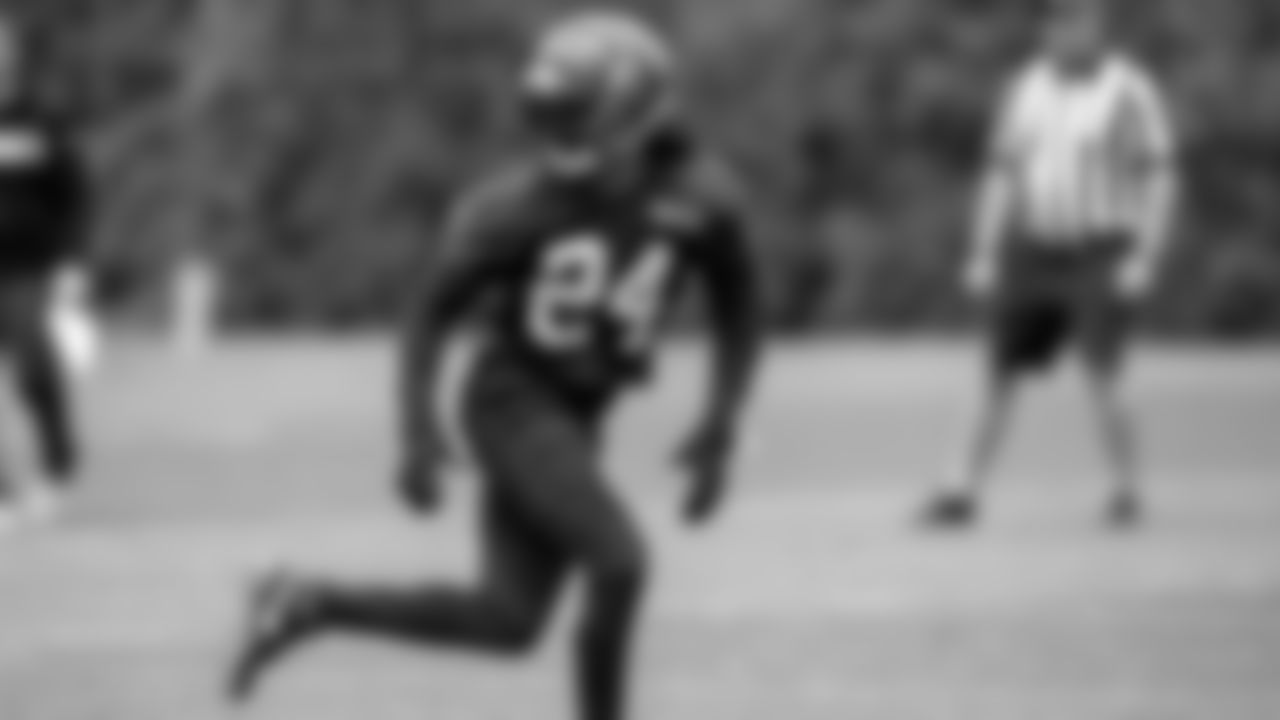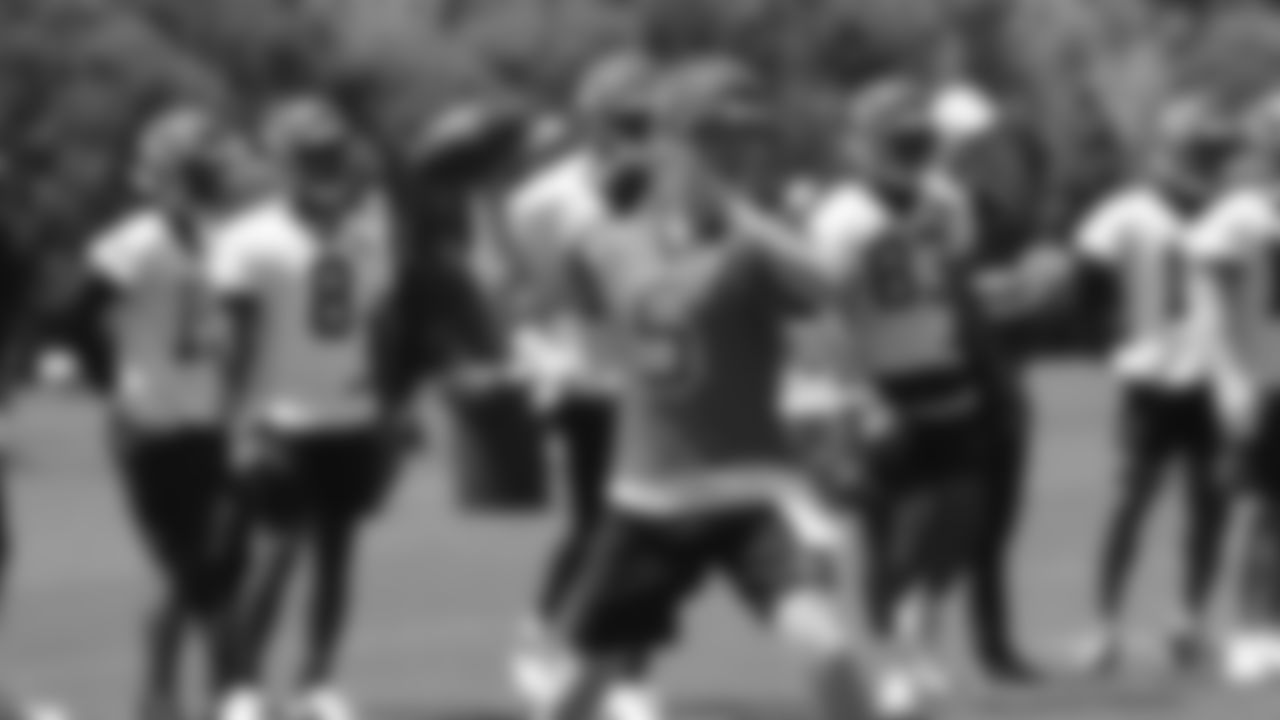As veteran defensive end Carlos Dunlap stood outside of his locker giving an interview to media members, Renell Wren walks by and extends his arm.
It's a simple gesture, but the rookie defensive tackle's fist bump to Dunlap is one of those little things that coaches and fans love to see when building team chemistry.
Helping the young players get acclimated to life in the NFL as quick as possible is a dynamic all 32 NFL teams face. With coaches consistently on the move, the draft and free agency, developing team chemistry and acclimating young players to the league can be more difficult than ever, especially without strong leadership.
That's where a veteran like Dunlap comes in. At 30, he's been around the block. Going on Year 10, Dunlap has plenty of guidance to give, all for the purpose of helping the team.
"Experience and expertise and I'm not afraid to spread the wealth," said Dunlap. "I know I stumbled through some things early in my years. I try to talk them through or let them know when some things come up. Explain what to do, how to be and be ahead of the curve so they can help us. At the end of the day, we are a team and we are all brothers."
The Bengals' elder statesmen have been quick in not only helping the rookies with their transition to the NFL because the game is much faster, but also preaching accountability.
Wren noticed that right away when he first arrived in Cincinnati.
"I know it is a different pace from college to the NFL," Wren said. "So now it's a part of knowing your plays, getting down on the field and working on your craft. Your technique has to be better, you use more extensions, more leverage and just being a bigger part of the game. I talk to Geno (Atkins), (Andrew) Billings and Carlos on how to stay in the game and most of it is mental."
Check out some of the best images from the first week of Organized Team Activities.

RBs Joe Mixon and Giovani Bernard

QB Andy Dalton

DE Carlos Dunlap

TE Drew Sample

CB B.W. Webb

Head Coach Zac Taylor

CB KeiVarae Russell and OT Bobby Hart

WR John Ross

TE Drew Sample

DE Sam Hubbard

CB Dre Kirkpatrick

OT Cordy Glenn

LB Jordan Evans

TE Jordan Franks

QB Ryan Finley

OL John Miller

RB Giovani Bernard
Organized team activities serve the purpose of breaking in rookies and familiarizing veterans with those new to the life of professional football.
This time in 2018, Darius Phillips was in those shoes. A year later, the second-year cornerback better understands the give and take of succeeding in the NFL.
"I still get advice and I try to help as much as people helped me," Phillips said. "I look up to guys like Darqueze (Dennard) and Shawn (Williams) to try to steer me in the right direction. I felt when I first got here I had to do everything perfectly and it is just so fast and I wasn't thinking. Now when I get out there I think about what could happen before it does happen. That helps me out a lot."
More than ever, the focus on the mental side of the game is continually communicated. It's not just managing the internal factors, but external ones as well.
"The biggest difference has been the expectations are a little bit higher," Davontae Harris said on his jump from year one to two. "They give you more leeway to give you focus because you get acclimated to here. As (the coaches) up your expectations, you have to up your expectations."
After either being drafted or signing as a free agent, Bengals rookies enjoyed a brief introduction to NFL practice during rookie minicamp two weeks ago. Since then the organized team activities are their first chance to practice alongside the veterans.
The first-year players are also are required to participate in the league's Rookie Transition Program. All NFL rookies, both drafted and undrafted, partake in the symposium which is designed to provide the resources for a successful transition to the NFL.
Per the NFL, mandatory topics covered include social responsibility, respect at work, mental health, character and values, and player engagement resources. Teams also cover other key topics either as part of the three-day program or prior to it, including player health and safety, a review of player policies and resources, working with the news media in the age of social media, financial education, and playing rule changes from college to the pros.
It can be a lot to take in for a first-year player. For the rookies like linebacker Germaine Pratt, he understands to make it in the NFL, he must act like an information sponge.
"The (veterans) give great information about the defense, as well as the ins and outs," Pratt said. "The vets also tell you how to be a pro and how to carry yourself. They guide you to different people to help you with what you need."
The infusion of energy and talent, along with the new Bengals coaching staff, has made this year's OTAs one of the more interesting ones in recent memory.
All players want to play every snap. However, if the competition is healthy from an individual development standpoint, it gives the Bengals as a team the best chance to win each week.
"At the end of the day you making (the rookies) better challenges you to work harder," Dunlap said. "Competition brings out the best in everybody. If I can make them better and help them raise their level, it's going to challenge me to stay on my P's and Q's all day every day so I can remain an elite football player. I don't mind helping develop the young guys."







